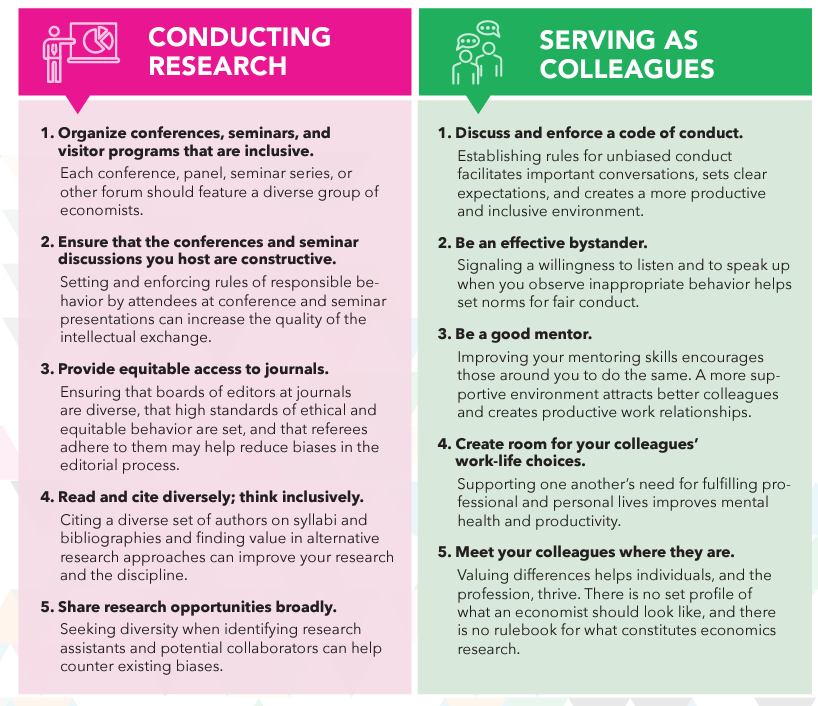Be the change in economics
Our profession has immense power in the world and with power comes responsibility. It's time to face the facts. We are a disgrace and must do better.
Today’s post is not a play-by-play of the meltdown on EconTwitter or EJMR in the past several days. I am sad, I am furious, and I am exhausted. I had to disengage this weekend, it was opening up old wounds. Frankly, I am dealing with too much to take on more fights in public. I am doing privately what I can.
My post is not for students, early career people, and those who have been hurt. Don’t read it. You are not the ones who should clean up the mess you did not create. My post is for those of us with power in the profession, the leaders. We must step up and lead.
Economics has a systemic problem, and we need systemic solutions.
In the summer of 2020, I got angry over the abuse and demeaning of students, both undergraduate and Ph.D. students, who had come to me. I wrote my “economics is a disgrace” piece. I wrote it first for Ben Bernanke and Janet Yellen, the former and current Presidents of the American Economics Association. They read it and told me there was nothing more they could do. They also said they would not share it with AEA Executive Committee. So I shared it with the world.
The retaliation was swift and cruel. I did not single out a handful of people. I wrote about several untouchable men at the top of the profession. I argued that we had a systemic problem. I named names of men. Why should it always be the less powerful victims of abuse whose names we know? To put it mildly, my argument that we had a systemic problem was not what came across. It was the names of the men.
So, what did I do? I recently removed their names and gave them alphabet labels AAAA to OOOO. I redacted more information. If you have not read it, you should. As you do, think of how many men and women you know could be behind those alphabet labels. It’s sickening how widespread the toxicity is.
Our culture is a choice, and we must choose better. We owe to the next generation.
Create an environment in which everyone thrives
We have a responsibility to create an intellectual community that supports others. In fact, the American Economics Association has both a Code of Professional Conduct and a Policy on Harassment and Discrimination. Read them. Here are practical tips from a talk I have given at several institutions. Read it.
Here from the American Economics Association on Best Practices for Economists. Choose one in each category as a department and commit to practicing them. Track your progress and reward those who exemplify the practice. Incentives work!
Do your part in supporting others
Individuals have a responsibility too. Everyone in the profession should read Cesi Cruz’s thread. Accountability starts with simple gestures. Do not look away when your colleague gets too close or crosses the line with someone, especially someone they have power over. The powerful must lead the way. I have seen it at the Fed, and it’s uplifting. Sadly, I saw a lot of abuse of power and cheap talk with the weekend on Twitter. I make mistakes too. I regret them, and I have apologized for most, and the rest I will someday when I can do it sincerely.

Give others and yourself grace when you make a mistake, and then correct it. Do not do it again. Be especially mindful of the next generation.
Give shit or shut up
My first boss at the Fed gave me excellent advice, “Claudia, you can’t make people care about the things you care about.” My reply to him was, “True, and you can’t make me stop caring.”
I can demand that you do not harass, demean, or abuse the students, research assistants, post-docs, peers, or anyone you have power and prestige over. I advise anyone who comes to me on how to navigate the official channels and resources. I participated in the intensive manager training at the Fed; I know the law and make sure others do too. No one is above the law. Everyone is responsible for our climate.
In closing
We owe it to our economics community and the billions of people our policy advice affects to improve our culture, institutions, and behavior. The problems in economics are longstanding and well-known. We also have a wide range of resources and platforms to lead change. It’s time to use them.








I am no economist, I find your strength and compassion so admirable. Thank you for caring and sharing.
Brava again. I could not stop reading your extensive, detailed, emotional story of oppression and suppression. I am thankful for your persistent strength and bravery, not to mention your insights.
As a family doc I had a special interest in psychiatry. I once went to a day-long session on "difficult to treat bipolar patients." The first talk was by a nattily dressed psychiatrist who spent 10 minutes showing flamboyant slides of all sorts of things and animals. His punch line was the world would be a dull place without "us bipolars" and many accomplishments of innovation and creativity would have been lost. You are among good company. You are needed!